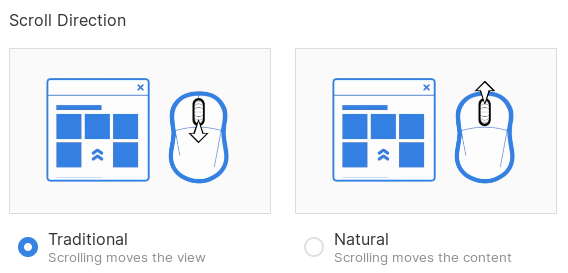Despite being a heavy cell phone user for more than 25 years, it only recently occurred to me that vertical navigation on most phones is inverted when compared to traditional computers. You swipe down to navigate upward, and up to navigate downward. I recently spent time using a MacBook, which apparently defaults to this “natural” scrolling (mobile-style), and I was completely thrown off by it.
I’ve been using natural scrolling on a couple of my own desktops ever since, mostly as a mental exercise, and I wondered…how many of you folks prefer this method?



The thing you’re apparently calling “traditional” seems natural to me.
I’ve never really stopped and thought about it before, but as far as I can figure, my brain expects the part of the system that does or would actually touch the surface to drag the screen in a particular direction through the simple workings of physics.
On a touchscreen, it’s simple - it’s my finger actually touching the screen and it drags the screen around exactly as I’d expect.
With a mouse, my finger isn’t the important part because it’s not touching the surface (or more precisely, the mousepad that substitutes for the surface). Rather, my finger is contolling the mouse, and the underside of the mouse is touching the surface. And as far as that goes, the “traditional” way it works is correct - when I move my finger downward on the mouse wheel, the bottom side of the wheel - the part that would actually be touching the surface if it was a purely mechanical system - is moving upward, so would drag the screen upward.
So to me, that’s what’s natural.
I couldn’t explain this as good, but to me tradition has always felt natural. 100% on a mouse, but also mostly on a trackpad.
I think the big contention comes with touchpads. They are half way between a mouse and a touch screen. Traditionally they acted like mice, you two finger down to scroll down like on a mouse wheel - but you have no wheel so are directly touching the surface. Much more like a touchscreen.
So to me traditional feels natural to me on a actual mouse, but on a trackpad natural feels more natural. I really hate that on the Mac you can only set all mouse life devices one way and not be able to have actual mice behave different to trackpads like I can on Linux systems.
It’s the most logical thing, and yet some people give me a weird look if I explain these thoughts to them.
I can’t even begin to describe how wrong it feels to invert it. My entire being refuses to accept that.
(you do realize I’m agreeing with you?)
I never was able to completely realize that it’s the wheel that makes it intuitive — that pulling down on the wheel makes the bottom of the wheel pull the screen up. But it makes so much sense, and it’s why I use “traditional” scrolling on mouse.
It’s something I was never actually conscious of until I stopped and thought about it yesterday because of this thread. I’ve just always moved the scroll wheel in the way that it seems like it should work, and it works the way it seems like it should.